Earlier this year, Dell launched a pair of servers purpose-built for cloud service providers (CSPs). The new PowerEdge Cloud Scale Servers are optimized for large-scale, multi-vendor data centers. The PowerEdge HS5610 1U and HS5620 2U servers can be configured with a broad selection of differentiated performance options, various storage devices and capacities, and system management solutions.
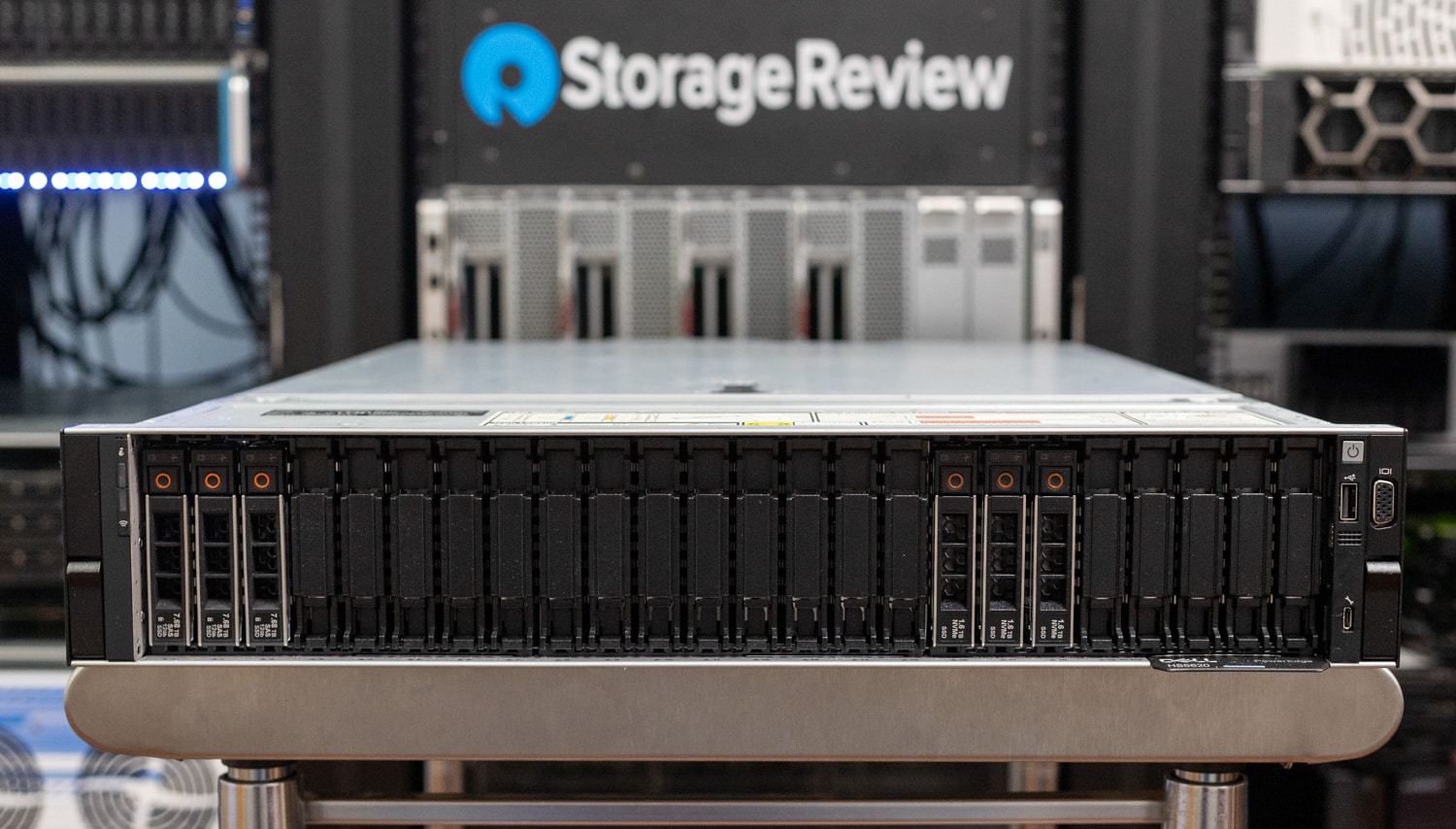
The two-socket PowerEdge Cloud Scale Servers are powered by up to two Intel® Xeon® Scalable processors (up to 32 cores per socket). Tailored for digital services and hosting workloads such as virtualization/cloud, scale-out, and software-defined storage (SDS), these new servers simplify deployment and scalability and accelerate time-to-market with pre-configured and validated platforms.
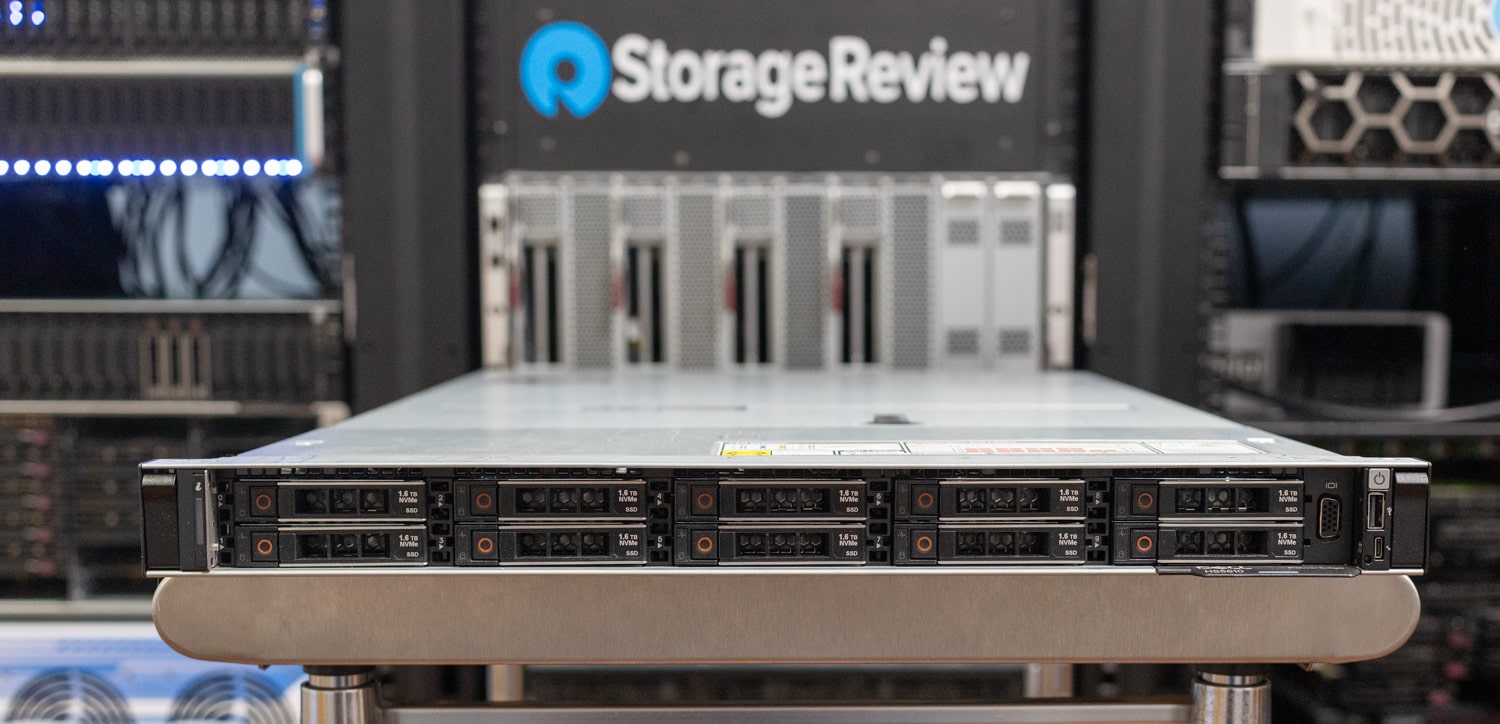
These servers are not, however, for everyone. The PowerEdge HS5610 and HS5620 cloud-scale servers are designed exclusively for select CSPs through Dell’s Hyperscale Next Program. This program is designed to speed innovation with standard and open product solutions so CSPs can scale their server infrastructures and improve business momentum and outcomes.
In keeping with the Dell mantra for simplicity, CSPs can leverage a single, open-embedded system management stack that allows for scalable operations and easier migration paths across different infrastructures. The servers can be configured with iDRAC and OpenManage Enterprise system tools or with Open Server Manager built on Open BMC™.
Two Cloud Scale Servers for Multiple CSP Challenges
Dell has designed the new servers to meet specific requirements and needs based on workloads. Customers don’t need to pay for features they may never use, but they still get the industry-leading PowerEdge server to meet their needs.
The Dell PowerEdge HS5610 1U server (spec sheet) is optimized for high-density, scalable computing. The PowerEdge HS5620 (spec sheet) offers a 2U chassis with more storage and expansion options. Both servers are known for being energy efficient and robust thanks to the Intel Xeon processors. These designs are tailored to manage large workloads and data-intensive applications, making them a good fit for cloud service providers and large-scale data centers.
Dell PowerEdge Cloud Scale Servers High-Level Specs
| Model | Workloads | Memory | Processor | Storage | System Management |
| HS5610 | Virtualization, cloud-native compute-intensive applications, and scale-out database | DDR5 Memory, up to 2TB 4800 MT/s | Up to two Intel® Xeon® processors | Up to 6 x 2.5 NVMe | iDRAC or OSM |
| Up to 4 x 3.5 SAS/SATA | |||||
| Up to 10 x 2.5 SAS/SATA/NVMe | |||||
| HS5620 | Virtualization for medium VM density, cloud-native storage-intensive applications, and Software-Defined Storage Node | DDR5 Memory, up to 2TB 4800 MT/s | Up to two Intel® Xeon® processors | Up to 8 x 2.5 NVMe | iDRAC or OSM |
| Up to 12 x 3.5 SAS/SATA | |||||
| Up to 16 x 2.5 SAS/SATA | |||||
| Up to 24 drives with 16 x 2.5 SAS/SATA plus 8 x 2.5 NVMe |
As the public cloud market grows and provides more services to customers, the dominant hyperscalers often receive preferential treatment from technology vendors. This gives them early access to new technologies, constantly jumping to the head of the queue and allowing them to quickly bring innovative services to market.
This inherent advantage makes it harder for the next tier of cloud service providers, hosters, and online service providers to differentiate themselves. Instead, they have to wait until these technologies become generally available, which can take several months, hindering their ability to respond rapidly to evolving technologies and customer demands.
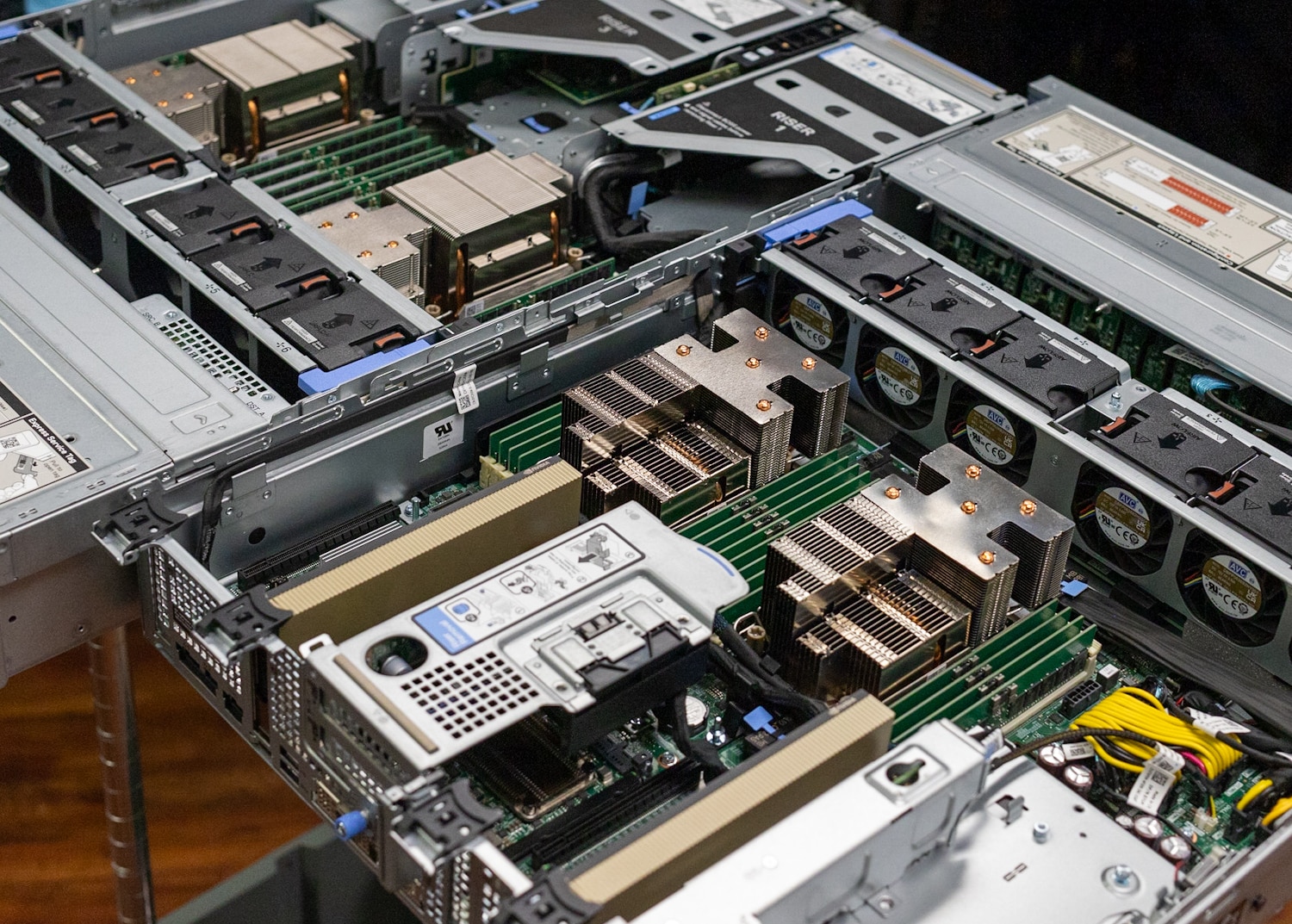
HS5620 (right) compared to the R760 (left)
Dell has addressed the issue by creating these purpose-built PowerEdge servers and the Hyperscale Next Program. This program is designed to help cloud service providers react to changing technologies and customer demands. It offers early access to new technology, advanced support services, server performance tuning, and more. Customers participating in the program can expand their cloud services and applications and provide superior performance for their specific workloads.
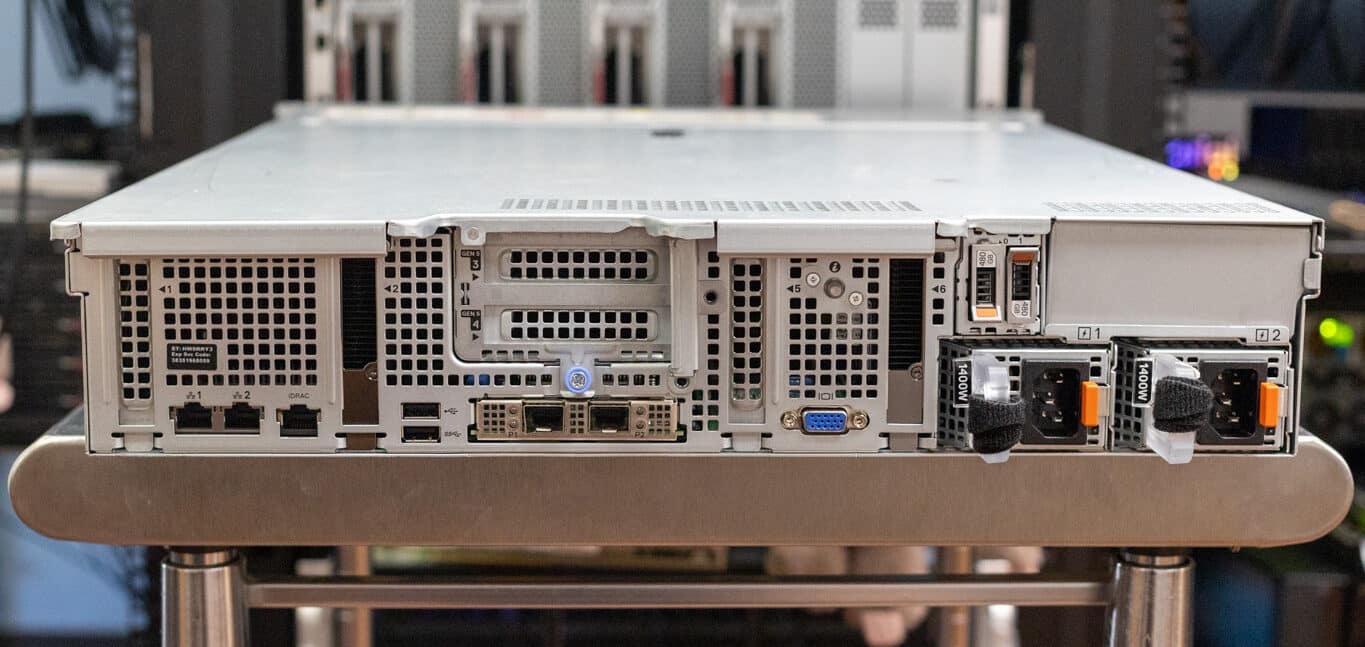
HS5620 Rear
Consultative Performance Tuning with Dell
Understanding that time-to-value is crucial when making IT purchasing decisions, Dell also offers the Hyperscale Next Performance Tuning Program. This program gives select customers a zero-cost head start when evaluating and adopting new enterprise technologies, ultimately helping apply the right tech to a customer’s specific set of IT challenges.

HS5610 BOSS Boot Drives
Through the performance tuning program, customers collaborate with Dell’s team of top-tier performance engineers to configure and optimize a PowerEdge server that aligns with distinctive workload demands. This direct engagement allows engineers to fully understand the requirements and consequently conduct iterative testing in the laboratory to generate data-driven recommendations for achieving optimal workload performance.
To arrive at the optimal server configuration, Dell depends on customers to answer a few questions related to mapping a workload or use case to a server. Typical explorations include:
- Server: Which server meets workload and use-case requirements?
- CPU: Which CPU SKU delivers the best price/performance? More cores or higher frequency?
- Storage/Memory: What are the capacity and performance requirements?
- BIOS and Firmware: Which settings deliver the best performance for the workload?
- Networking: What is the networking bandwidth requirement per CPU?
- Power: Are there power constraints?
- Cost: What is the budget?
It should be noted that this is more than just a survey; Dell gets very hands-on through this process. After the basics are sorted out, Dell engineers map the customer workloads to synthetic benchmarks that act as proxies for the workloads. Engineers then perform iterative benchmarking in Dell’s lab to study the effects of various BIOS, firmware, OS settings, and system settings on workload performance. Finally, the engineering team analyzes the data to identify the hardware configuration and server settings that deliver optimal performance for that workload.
When all data is compiled, Dell’s engineers work with the customer to identify the workload’s appropriate server, components, and settings. For example, when running a transactional database, selecting a CPU SKU with a lower core count and higher frequency can yield high performance while being more cost-effective due to licensing costs. Similarly, configuring memory with DIMMs’ optimal quantity, capacity, and speed enhances performance and reduces the total cost of ownership (TCO).
The Hyperscale Next Performance Tuning Program is a major differentiator when comparing the PowerEdge HS5610 and HS5620 cloud-scale servers with competing products. It’s difficult to underscore the benefits of this consultative approach fully. Still, CSPs who have been through the process before will notice a difference in the thoroughness of Dell’s process. This is a critical step in the server procurement flow. When customers buy server quantities measured in racks, making the right hardware decisions the first time is absolutely critical.
Dell PowerEdge Cloud Scale Server Security
Robust security features take center stage in the Dell HS5610 and HS5620. Key security features include:
- Data at Rest Encryption (SEDs) with local or external key management
- Secure Boot and Cryptographically signed firmware ensure only trusted software and firmware are loaded during server startup.
- Secure Erase
- Secured Component Verification
- Silicon Root of Trust
- System Lockdown (requires iDRAC9 Enterprise or Datacenter)
- TPM 2.0 FIPS, CC-TCG certified, TPM 2.0 China NationZ
This suite of physical and software security features is designed to ensure the Dell PowerEdge Cloud Scale Servers exceed any customer’s needs. These features have been tested and enhanced over time and have long been a fundamental part of the PowerEdge value proposition for enterprise customers. Now, CSPs can take advantage of Dell’s security offerings, delivering peace of mind where data integrity, system availability, and secure operations are paramount.
Powered by Intel Xeon Scalable Processor
The Intel Xeon® Scalable Processors stack is the next-generation data center processor offering significant performance increases, integrated acceleration, and next-generation memory and I/O. The Intel Xeon processor accelerates customer usage with unique workload optimizations.
The features and functions of the Intel Xeon Scalable Processor include:
- Faster UPI with up to four Intel Ultra Path Interconnect (Intel UPI) at up to 16 GT/s, increasing multi-socket bandwidth
- More, faster I/O with PCI Express 5 and up to 80 lanes (per socket)
- Enhanced Memory Performance with DDR5 support and memory speed up to 4800 MT/s in one DIMM per channel (1DPC) and 4400 MT/s in two DIMM per channel (2DPC)
- New built-in accelerators for data analytics, networking, storage, crypto, and data compression
Dell PowerEdge HS5610 Cold Aisle Servicing
In addition to the standard 1U version of the HS5610, Dell customers asked for a variation of the server that is more consistent with their cold aisle serviceability needs. When configured with the 6 x 2.5″ NVMe backplane, the HS5610 supports cold aisle servicing, delivering yet another option for CSPs. Dell also offers a blind mate AC power module so users don’t have to enter the hot aisle to unplug the AC power.
Cold aisle servicing for servers offers several significant benefits, particularly in data center environments. In addition to ease of access, cold aisle servicing provides efficient cooling, focusing the cool air directly in front of server racks. This direct path reduces hot and cold air mixing, making cooling systems more efficient.
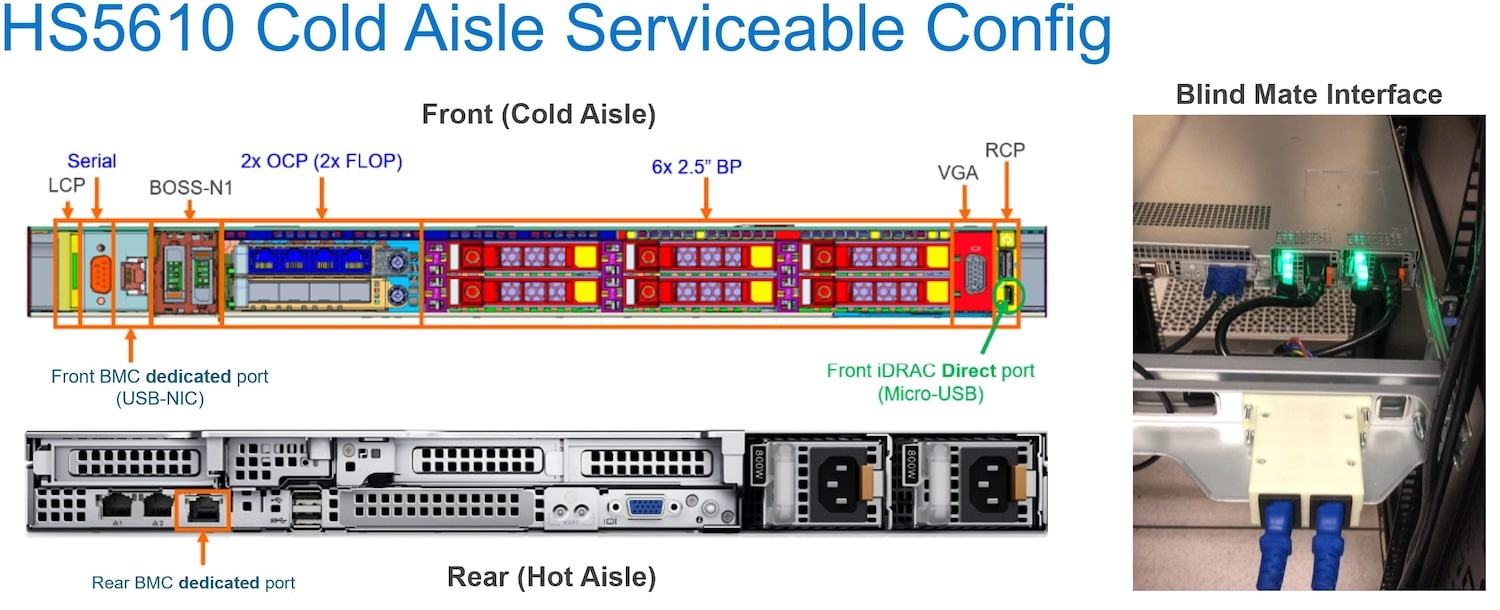
Cold aisle containment can lead to significant energy savings by optimizing cooling efficiency. Less energy is required to maintain optimal temperatures, reducing overall power consumption. That leads to increased overall cooling capacity of the data center and allows for higher-density deployments without overloading the existing cooling system. Not only do the servers benefit from cold aisle servicing, technicians get to work in a cooler and more comfortable environment, which can increase efficiency and reduce the risk of errors during maintenance tasks.
Cold aisle servicing is a strategic approach in data center management, focusing on enhancing cooling efficiency, reducing energy costs, and improving server equipment’s overall performance and lifespan.
Dell PowerEdge Cloud Scale Server Management
Dell PowerEdge Cloud Scale Servers are unique within Dell regarding management. Of course, the servers can be configured with the venerable iDRAC out-of-band management platform enterprise customers are familiar with. But Dell also supports OpenBMC™ (Baseboard Management Controller) as an option on the Dell PowerEdge Cloud Scale Servers.
Dell Open Server Manager (OSM) is built on OpenBMC, enabling open, embedded systems management on select Dell PowerEdge cloud-scale servers. Explicitly designed for cloud server providers managing large-scale data centers, Dell Open Server Manager is designed, tested, and validated to run securely on Dell PowerEdge HS servers.
OpenBMC is an open-source BMC firmware stack designed to run on various infrastructures. It is a Linux Foundation project with the backing of heavyweights Intel, IBM, Microsoft, and Google. Open Server Manager based on OpenBMC, aims to run the same embedded management software to deliver consistent management.
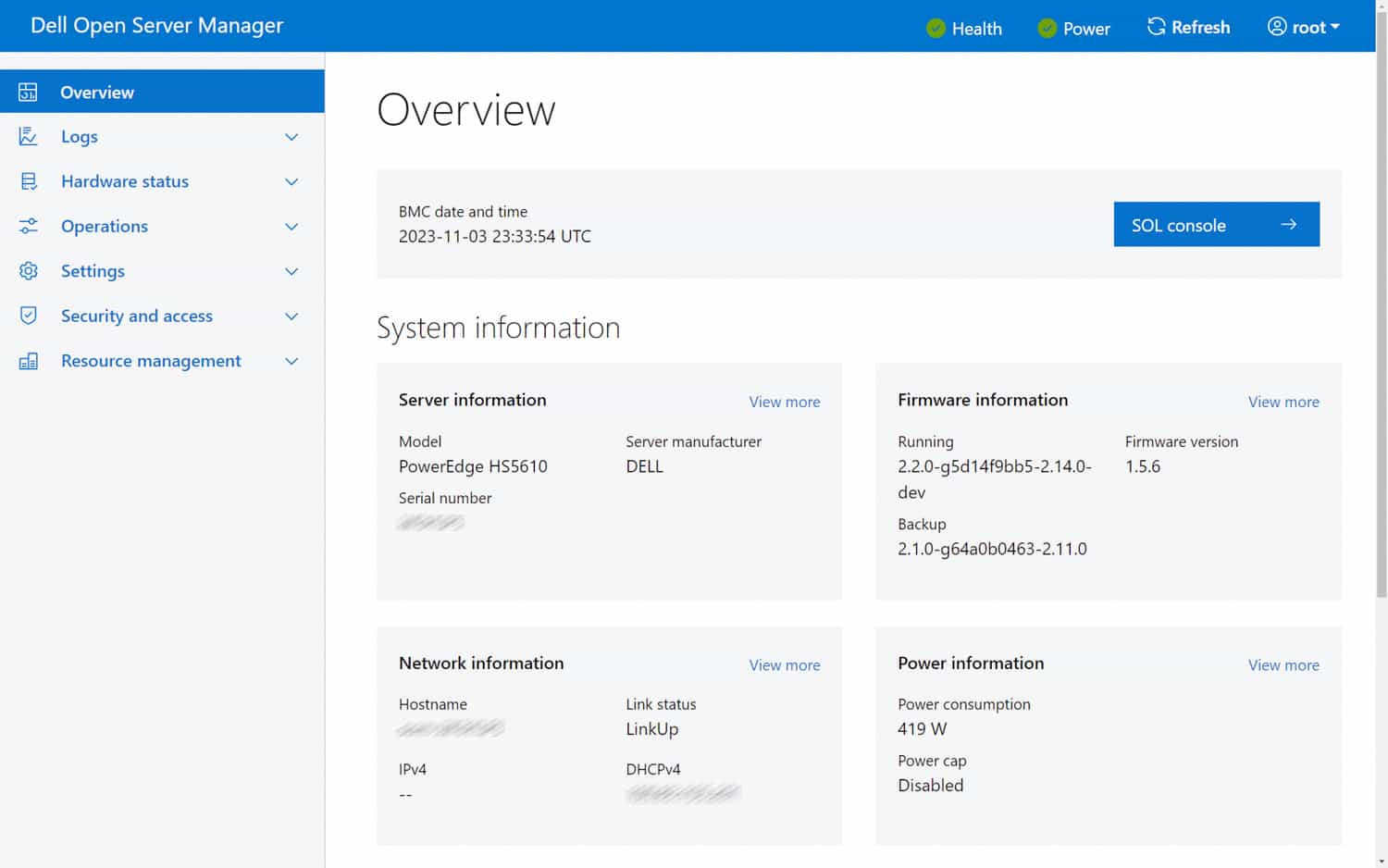
Dell Open Server Manager Overview
While we have seen OpenBMC deployed on many white box server platforms, Dell developed an Open Server Manager package that integrates with the premium fit and finish of existing Dell management solutions. Dell designed, tested, and validated Open Server Manager to securely run OpenBMC 2.14-dev for PowerEdge on select platforms like the PowerEdge Cloud Scale Servers. Customers familiar with OpenBMC can take advantage of the integration of a similar look and feel to Dell’s iDRAC.
Traditional iDRAC, as seen below, is more feature-filled, but as you can see by the OSM introduction screenshot, they both look and feel very similar.
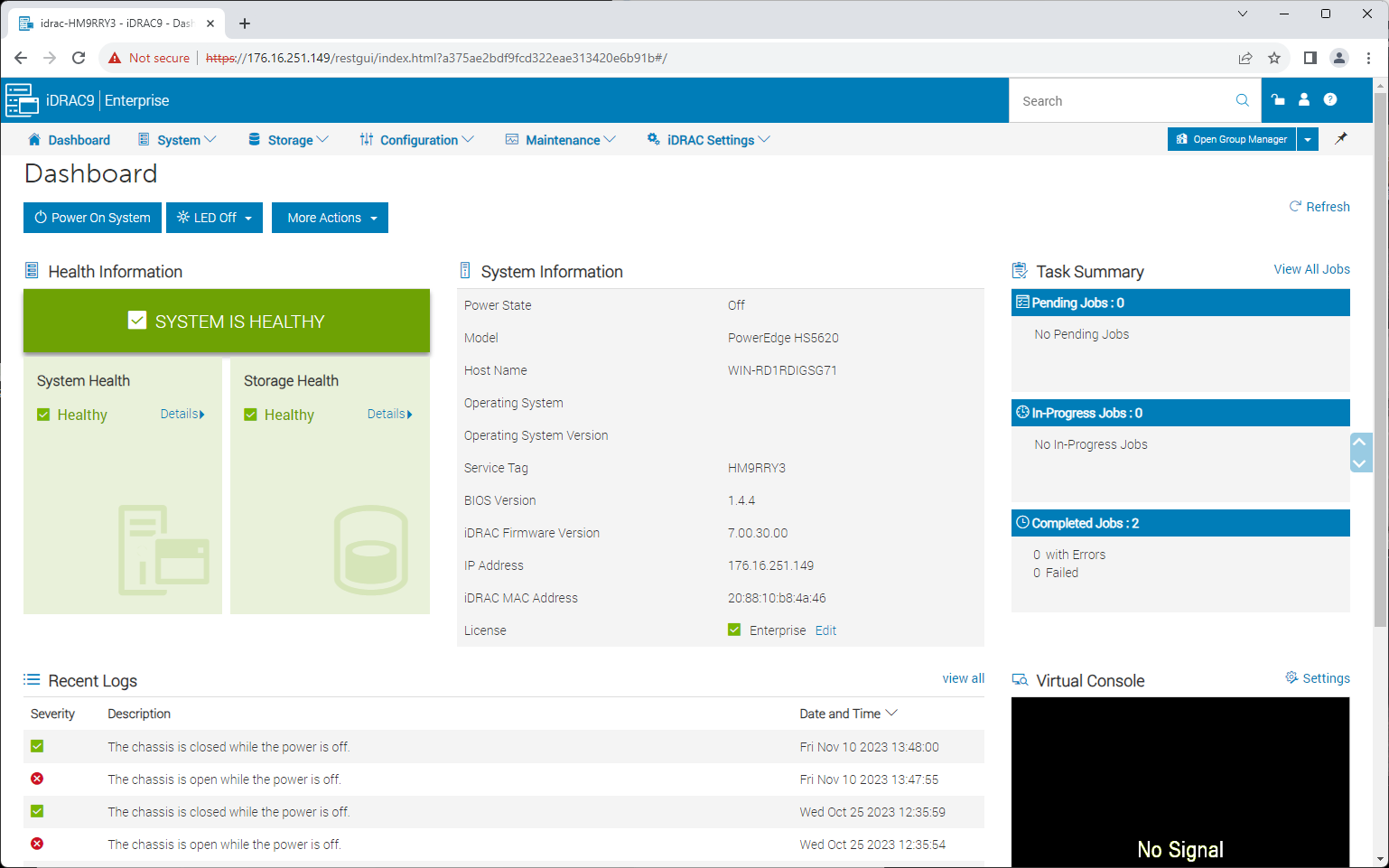
Dell iDRAC Dashboard
iDRAC offers a vast array of out-of-band configuration options, including but not limited to bios and performance settings.
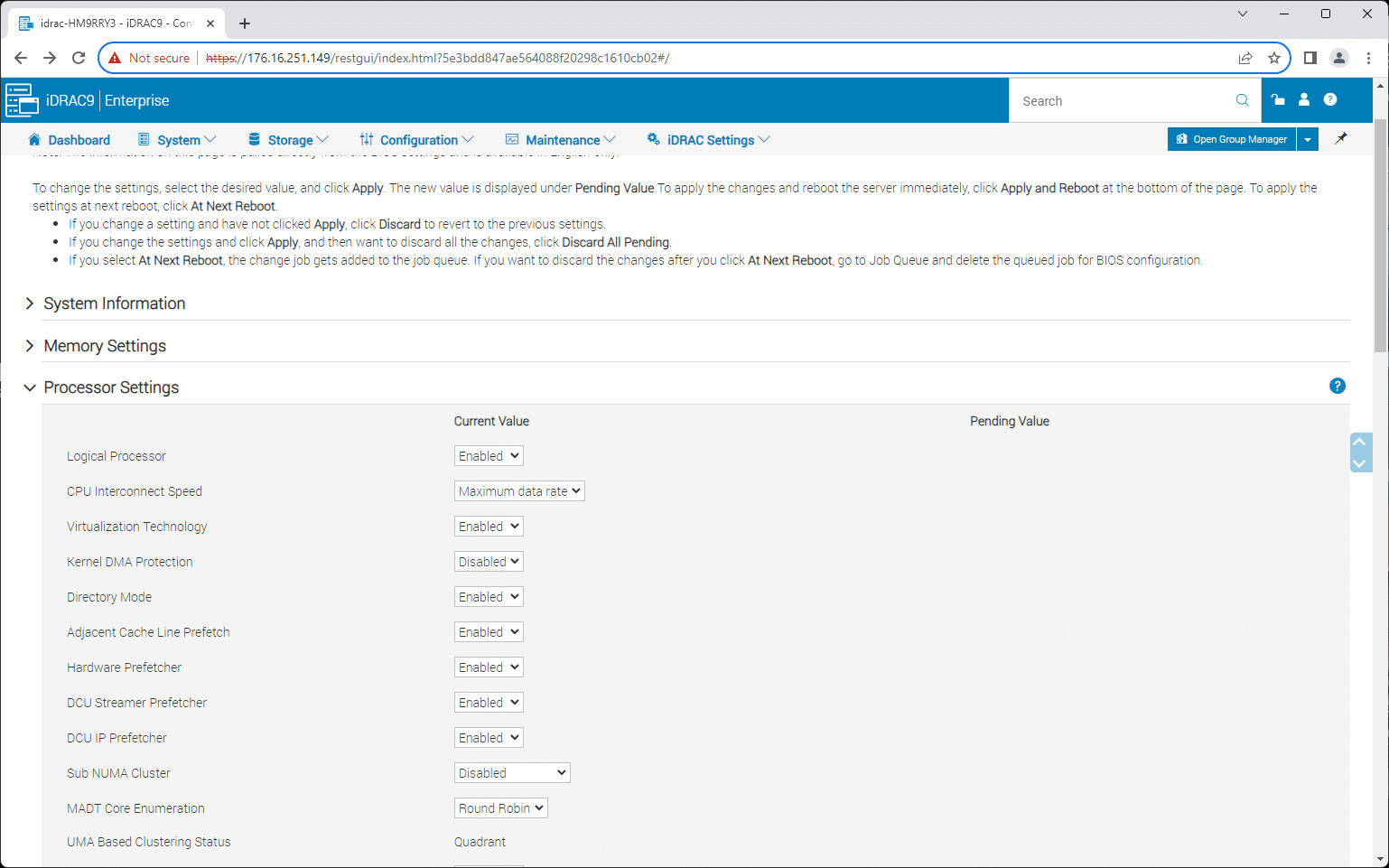
Open Server Manager allows remote monitoring, management, and control of servers. Further, OSM provides consistent system management across dissimilar infrastructures while maintaining code transparency for security validation and trust.
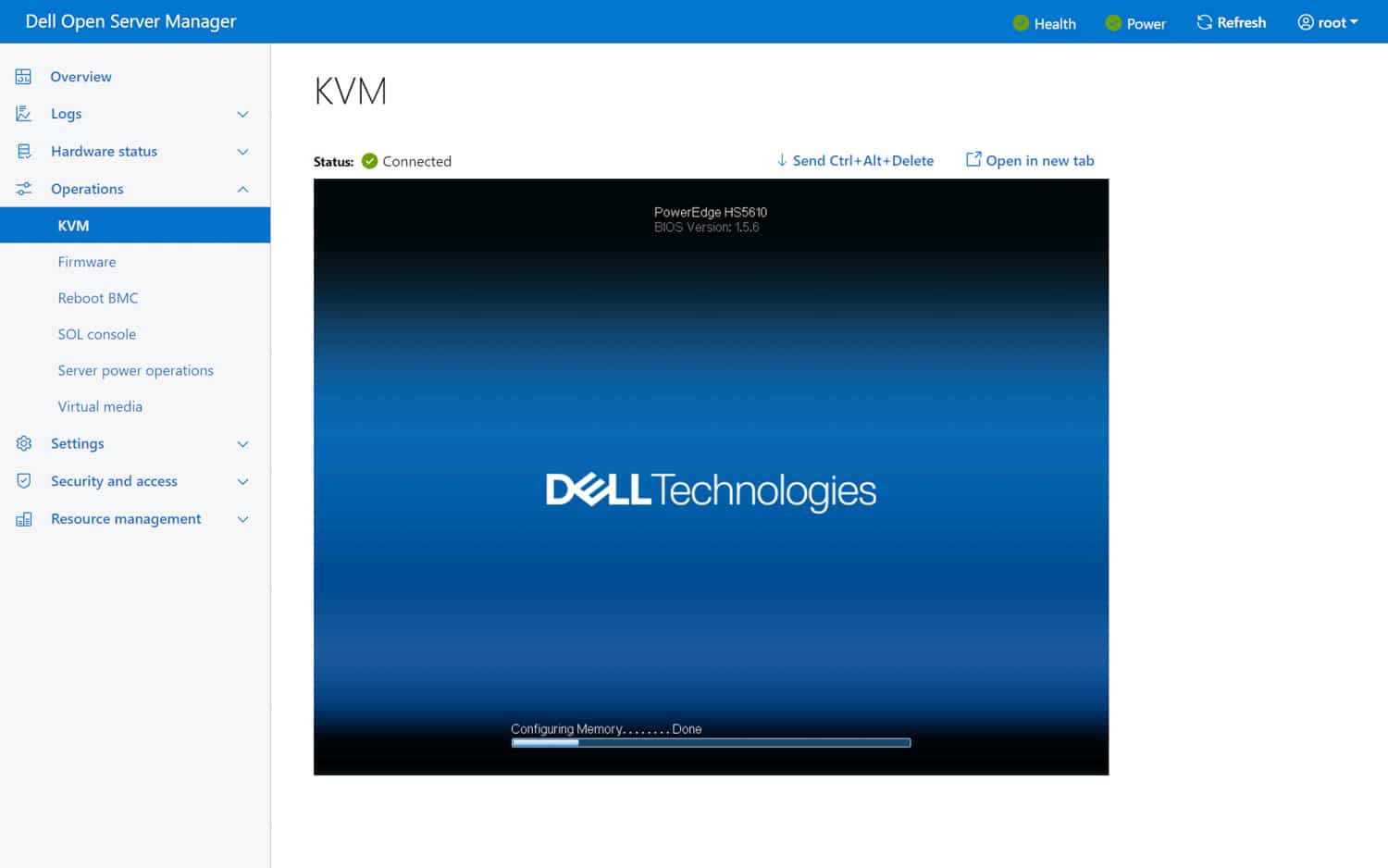
One exciting aspect of the PowerEdge Cloud Scale Servers regarding OSM is that you can move between OSM and iDRAC after the system has been deployed. This allows customers to test offerings and, if based on the use case, switch to iDRAC.
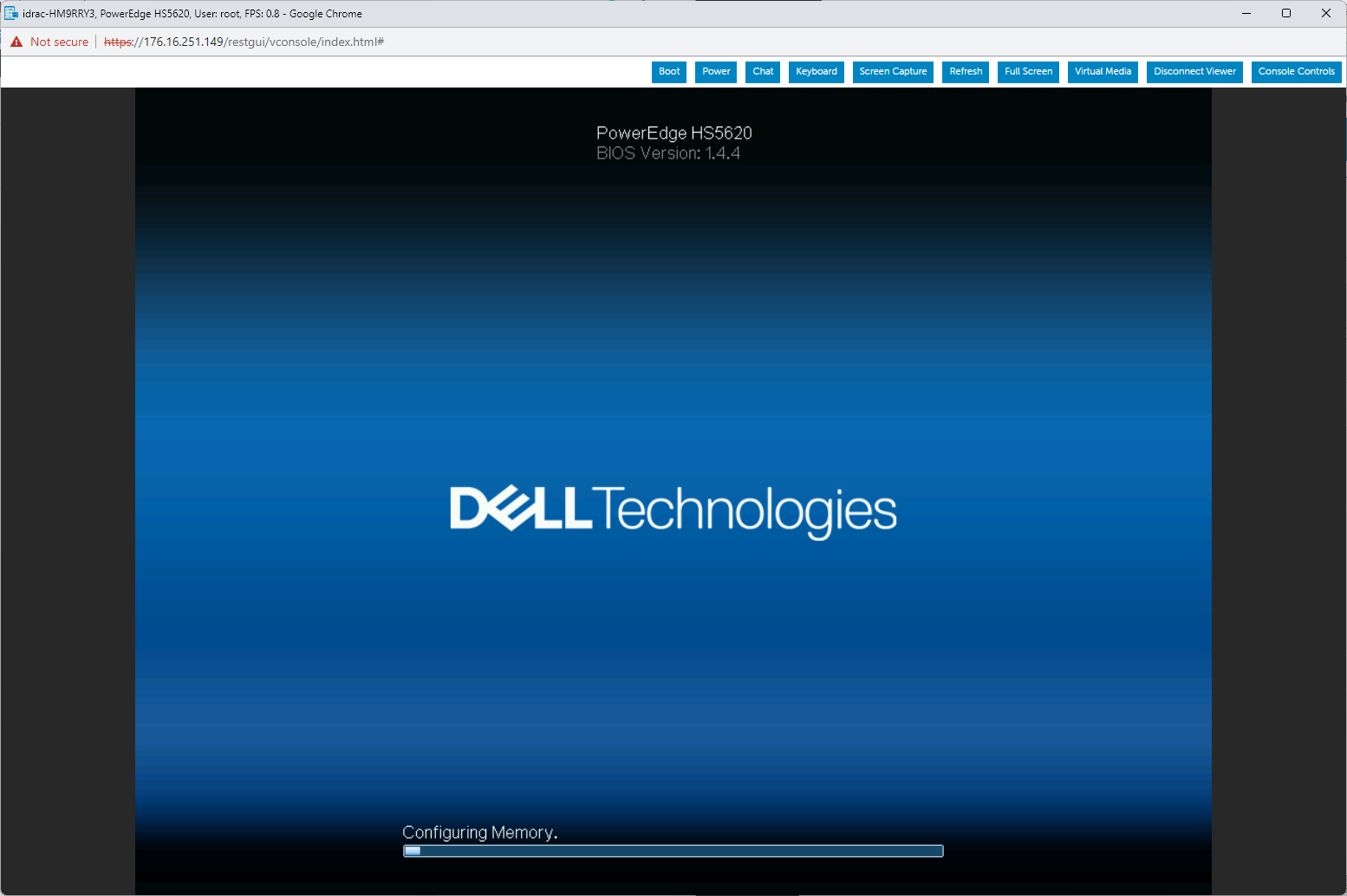
It should be noted that only those systems configured with OSM from the factory can change management types, as they ship with a specific personality module from the factory to allow OSM to operate. Servers configured with iDRAC in production don’t include this chip and can’t make the switch to OSM.
Another essential consideration is Dell’s LifeCycle Controller, which handles onboard firmware management and deployment needs and is only offered with iDRAC-equipped PowerEdge servers. Open Server Manager is still somewhat early in its development cycle, but the fact that Dell has provided it as an option points to the flexibility they want to enable with this class of PowerEdge.
Dell PowerEdge Cloud Scale Servers Support
Customers can ensure their PowerEdge Cloud Scale Servers are always on with backing from Dell Technologies Services from deployment to full-service logistics.
- The ProDeploy Factory Configuration service streamlines large-scale deployments by pre-configuring servers to your specifications, reducing administrative hours by 115 per 100 servers, based on a June 2023 Principled Technologies study.
- According to the same Principled Technologies study, the ProDeploy for Infrastructure service provides planning and 24×7 installation for swift technology adoption, significantly reducing admin time by over 223 hours per 100 servers.
- A ProSupport Plus for Infrastructure service delivers a 24×7 support solution and gives customers a dedicated service account manager and priority access to senior support engineers.
- Dell’s Logistics Online Inventory Solution ensures seamless parts management where you want and need them. Explore Dell’s services at Dell.com/Services.
Final Thoughts
Dell has stepped up its support for many smaller cloud service providers by introducing the HS5610 and HS5620 and, maybe more importantly, the Hyperscale Next program. Dell’s Hyperscale Next program is about helping cloud service providers and hosters stay ahead of the game, evening the playing field amongst the category giants.
Hyperscale Next is much more than window dressing; the program excels because customers can integrate with Dell engineers to get a head start on tuning and testing new server releases for specific tasks before these servers hit the market. This means that when these servers are ready to launch, customers have pre-engineered and tested configurations ready to roll out without delay. Delay is another critical consideration; Dell has invested heavily in logistics to ensure that Dell PowerEdge Cloud Scale Servers ship quickly to customers, taking top priority in Dell’s fulfillment operations. Plus, Dell’s global reach means they’ve got support everywhere. The program includes tailored services for high-volume data centers, ensuring they’re always running smoothly.
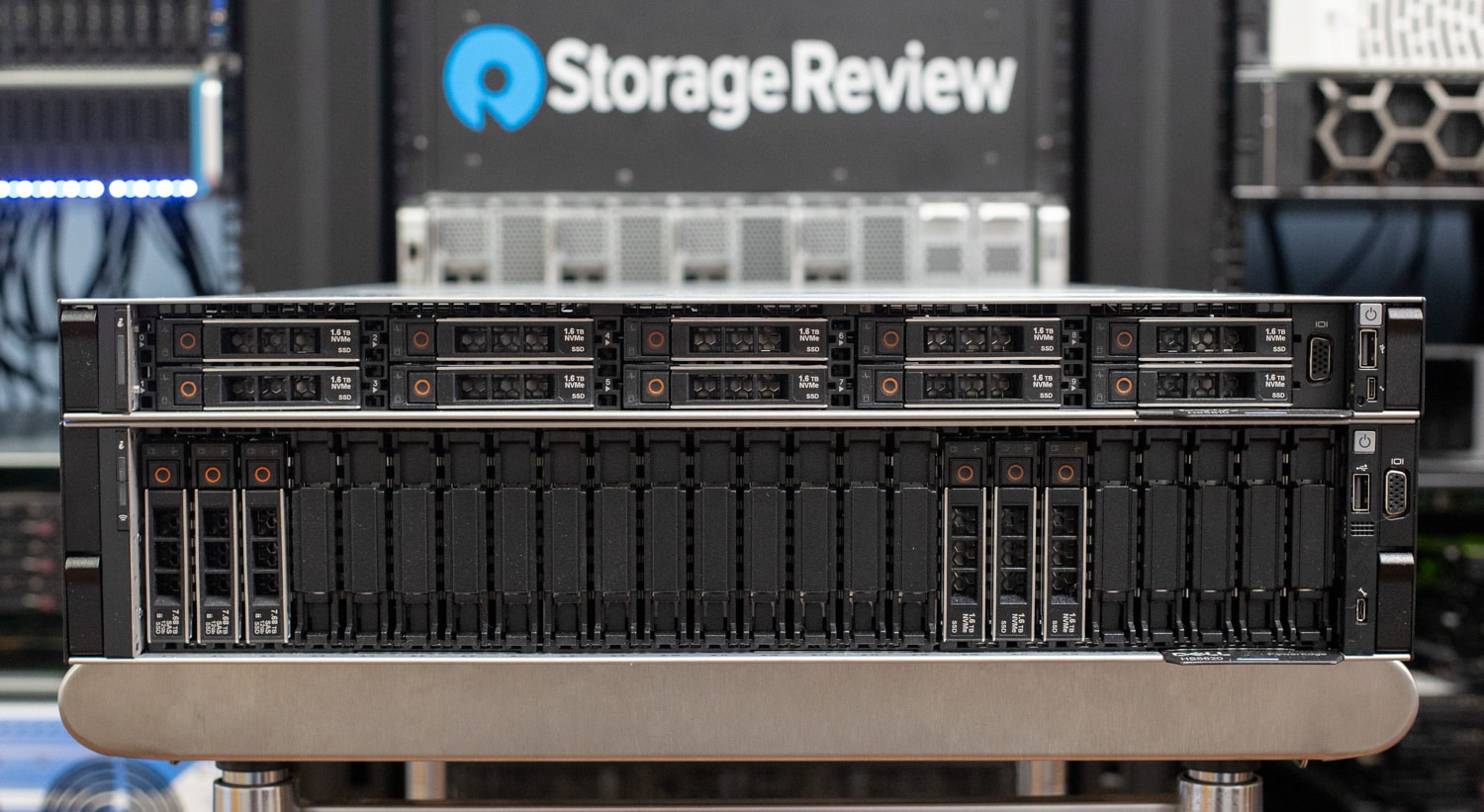
Ultimately, the Dell PowerEdge Cloud Scale Servers are specifically tuned versions of Dell’s PowerEdge servers that have led the industry for decades. They’re streamlined to give CSPs what they want without introducing costs for features that don’t add business value. Further, they’re highly secure, offer OPEX benefits like BOSS redundant boot drives and iDRAC/OpenBMC support, and can be fulfilled rapidly.
Many cloud providers had to make rushed decisions during the pandemic to secure hardware to support burgeoning apps and web users. Now is the time to rethink these server investments and consider what reliability, service, and support mean to the business so that strategic decisions can be made going forward.
Next Steps
- Explore the Dell PowerEdge Cloud Scale portfolio and how it can help your CSP business thrive by visiting www.dell.com/cloudscale.
- Reach out to your account team and request a conversation on the Hyperscale Next Program.
- Ask your Dell account representative about access to a Dell PowerEdge Cloud Scale Server evaluation unit. You can also register for an online demo and hands-on labs.
Additional Resources
- PowerEdge Cloud Scale Servers
- PowerEdge HS5610 Cloud Scale Server
- PowerEdge HS5620 Cloud Scale Server
This report is sponsored by Dell Technologies. All views and opinions expressed in this report are based on our unbiased view of the product(s) under consideration.




 Amazon
Amazon